Activities and Learning
Learning Skills for Kids
Offer your kids a head start in life by teaching them essential life skills, starting with the letter 'O'…
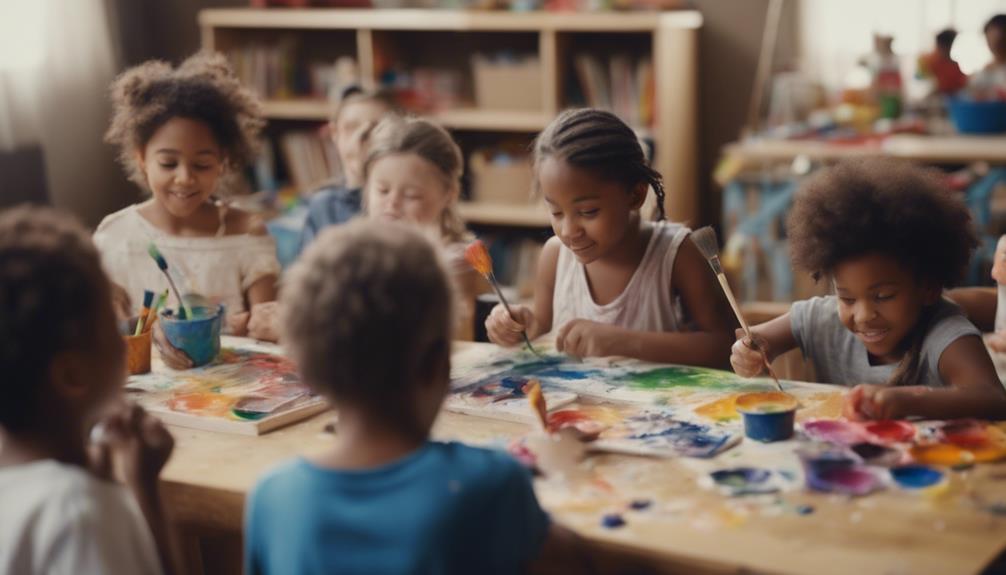
Equip your kids with essential life skills for success. Teach basic first aid like wound care and emergency response. Emphasize hygiene with proper handwashing to prevent illnesses. Encourage responsibility by caring for pets and plants, instilling empathy and consistency. Engage them in chores to build organizational skills and independence. Foster communication by practicing active listening and clear expression. Develop critical thinking for informed decision-making and problem-solving. Introduce financial literacy with concepts like budgeting and saving. These skills provide a strong foundation for their future.
Key Takeaways
- Basic First Aid and Hygiene:
- Teaching essential first aid and hygiene skills for safety and well-being.
- Responsibility and Empathy Building:
- Developing empathy and responsibility through caring for pets, plants, cleaning, and chores.
- Communication and Social Skills:
- Encouraging effective communication, critical thinking, decision-making, and problem-solving skills.
- Financial Literacy Introduction:
- Introducing money management, budgeting, saving, and distinguishing needs from wants.
- Life Skills Development:
- Fostering independence, organization, time management, self-esteem, and a sense of accomplishment.
Basic First Aid
Teaching kids basic first aid skills is vital for their safety and well-being. Equipping children with essential first aid skills empowers them to handle emergencies confidently. Kids can learn valuable first aid skills like cleaning and dressing wounds, applying bandages, and recognizing when to seek adult help.
Knowing how to call emergency services and providing necessary information can be critical in urgent situations. Furthermore, children can grasp basic techniques such as the recovery position for an unconscious person and the Heimlich maneuver for choking incidents.
Understanding not to touch sharp objects or hot surfaces and learning how to cool burns with cold water are fundamental aspects of basic first aid that kids should know. Additionally, identifying common allergens and knowing how to use an EpiPen for severe allergic reactions are valuable skills that can make a significant difference in critical situations.
Basic Hygiene

Maintaining good hygiene is essential for your health.
Handwashing is a simple yet effective way to prevent the spread of germs.
Dental care, like brushing and flossing, is also fundamental for a healthy smile.
Hand Washing Importance
Regular hand washing is an indispensable aspect of basic hygiene for kids. It plays a vital role in reducing the risk of various infections and diseases. By encouraging your child to wash their hands regularly, you can lower the chances of respiratory infections by 16-21% and prevent the spread of diarrheal diseases by up to 50%.
The Centers for Disease Control and Prevention (CDC) recommends washing hands with soap and water for at least 20 seconds to effectively remove germs. It's essential for kids to wash their hands before eating, after using the bathroom, and after touching surfaces in public areas to maintain good hygiene habits.
Teaching your child the importance of hand washing early on can help establish lifelong practices that protect against illnesses. So, remind your kids to scrub those hands thoroughly to keep themselves healthy and prevent the spread of harmful germs.
Dental Care Tips
To maintain good oral hygiene for your kids, ensuring proper dental care is essential. Brushing your child's teeth twice a day for two minutes each time is important in preventing cavities and gum disease. Remember to also encourage daily flossing to remove food particles and plaque between teeth, maintaining overall oral health.
Using fluoride toothpaste when brushing helps strengthen tooth enamel and protects against decay, further enhancing oral hygiene. Additionally, regular dental check-ups every six months play a crucial role in detecting and preventing oral health issues early on.
Caring for Pets and Plants
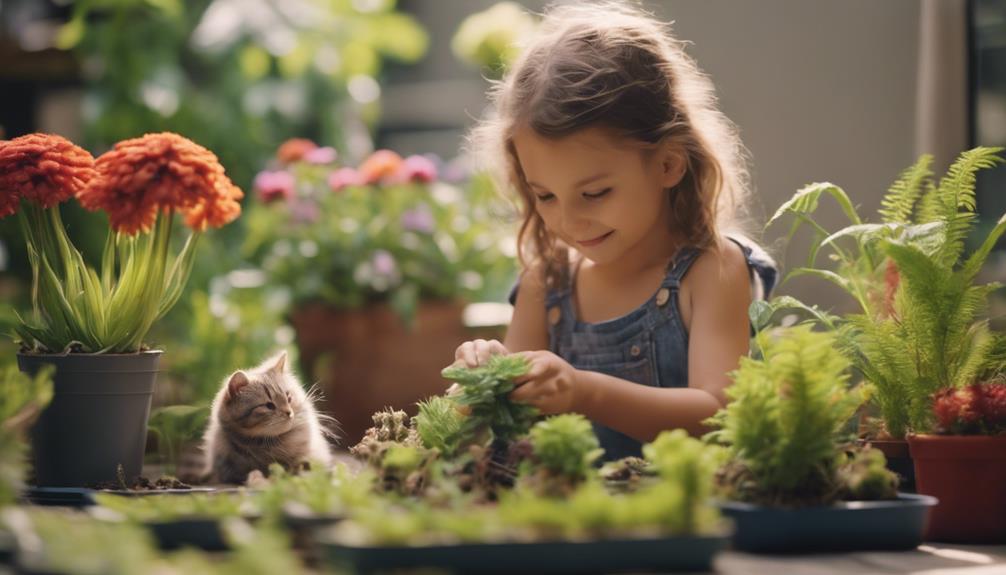
When teaching kids about caring for pets and plants, emphasize the importance of responsibility and empathy in their daily interactions. Caring for pets teaches children valuable life skills that extend beyond the basic needs of animals. Likewise, tending to plants fosters a deeper understanding of the natural world and the interconnectedness of living organisms. Here are some key points to keep in mind:
- Responsibility: By taking care of pets and plants, kids learn the significance of fulfilling tasks consistently and following through on commitments.
- Empathy: Understanding the needs of pets and plants helps children develop empathy by learning to take into account the feelings and well-being of living beings other than themselves.
- Routine Care: Establishing a regular care schedule for pets and plants not only guarantees their health and growth but also instills a sense of discipline and organization in children.
Cleaning and Chores

Engage children in cleaning and chores to instill responsibility and independence from a young age. Assigning age-appropriate tasks not only teaches them valuable life skills but also emphasizes the importance of contributing to the household. By involving children in cleaning and chores, they can enhance their organizational skills and time management abilities. Completing these tasks can boost their self-esteem and provide a sense of accomplishment. Regular practice of cleaning and chores helps children develop good habits that will benefit them in the long run.
| Benefits of Cleaning and Chores for Children | |
|---|---|
| Responsibility | Children learn to be responsible for their share of household tasks. |
| Independence | Engaging in chores fosters independence by teaching children to take care of their own spaces. |
| Organizational Skills | Cleaning activities help children develop organizational skills as they learn to tidy up and prioritize tasks. |
Communication Skills
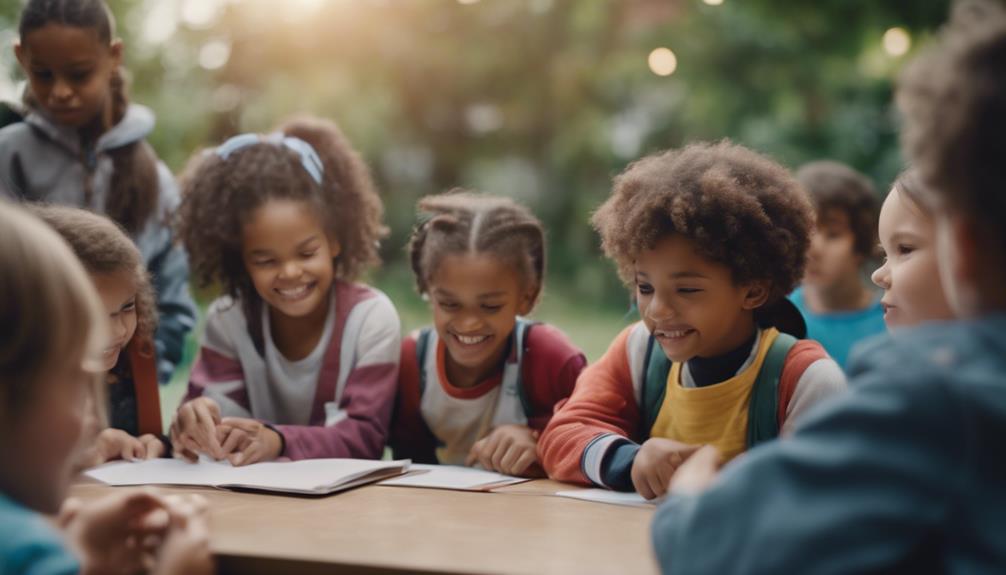
Communication skills are crucial for expressing your thoughts, feelings, and ideas effectively. Active listening, clear speech, and understanding nonverbal cues are key aspects of communication.
Listening Attentively
To listen attentively, focus your full attention on the speaker, maintain eye contact, and avoid distractions. Active listening involves showing interest through body language, nodding, and providing verbal cues like 'I see' or 'That makes sense.'
Encourage children to summarize or repeat what they've heard to enhance listening skills and comprehension. Moreover, practicing listening to various content types such as stories, instructions, or conversations can greatly improve overall listening abilities.
Developing good listening skills early on is essential as it can lead to better communication, stronger relationships, and improved academic performance. By mastering the art of active listening and engaging with the speaker, children can enhance their understanding of the world around them.
Encourage them to listen actively, ask questions for clarification, and reflect on what they've heard to foster effective communication skills from a young age.
Speaking Clearly
Mastering the skill of speaking clearly involves articulating words properly, maintaining a steady pace, and using appropriate volume.
To enhance your communication skills, consider incorporating vocal exercises into your routine. These exercises can strengthen your speech clarity and diction. Additionally, focusing on proper breathing techniques can help improve your speech projection and overall clarity.
Try practicing tongue twisters and vocal warm-ups to fine-tune your articulation. Speaking slowly and enunciating each word can greatly boost your communication effectiveness.
Engaging in activities like storytelling, reading aloud, and public speaking can also aid in developing clear speaking skills.
Nonverbal Cues
Improving your child's understanding and utilization of nonverbal cues can greatly enhance their social interactions and communication skills. Nonverbal cues, such as body language, facial expressions, gestures, and eye contact, are pivotal elements in effective communication.
Here are three key reasons why teaching your child about nonverbal cues is essential:
- Interpreting Emotions: Nonverbal cues help children decipher emotions, enabling them to understand how others feel and respond appropriately.
- Decoding Intentions: By recognizing nonverbal cues, children can better grasp the intentions behind someone's words, fostering clearer communication.
- Navigating Social Situations: Understanding social cues through nonverbal communication assists children in maneuvering various social scenarios with confidence and empathy.
Teaching children to be proficient in nonverbal communication not only enhances their social skills but also boosts their emotional intelligence, empathy, and overall competence in engaging with others effectively.
Critical Thinking

When teaching critical thinking to kids, emphasize the importance of analyzing information, understanding different perspectives, and making informed decisions. Critical thinking is essential for problem-solving and decision-making. Encouraging open-ended play can help children develop these skills in a fun and engaging way. By asking thought-provoking questions and engaging in debates, you can further enhance their critical thinking abilities.
Consider the following aspects of critical thinking:
| Critical Thinking | Benefits |
|---|---|
| Analyzing Information | Evaluate credibility of sources |
| Understanding Perspectives | Solve problems creatively |
| Making Informed Decisions | Think logically |
These elements of critical thinking foster independence, innovation, and the capability to navigate complex situations effectively. Starting to develop critical thinking skills from a young age can lead to improved academic performance, better decision-making abilities, and enhanced problem-solving skills.
Decision-Making Skills

When it comes to decision-making skills, it's all about analyzing your options, considering the consequences, and making choices that align with your values.
By practicing making decisions, seeking guidance, and learning from both successes and failures, kids can hone this essential skill.
Encouraging children to start making age-appropriate choices not only fosters confidence but also helps them become more independent thinkers.
Choices and Consequences
Teaching kids decision-making skills is vital for helping them understand the impact of their choices on outcomes. By fostering these skills, children can navigate through life's challenges with confidence.
Here are some key points to keep in mind when it comes to choices and consequences:
- Understanding the Link: Decision-making skills enable kids to recognize the direct correlation between the choices they make and the outcomes that follow. This awareness is essential for developing a sense of responsibility.
- Learning from Experience: Encouraging children to make decisions allows them to experience both positive and negative outcomes. This firsthand knowledge helps them refine their decision-making process and make better choices in the future.
- Building Critical Thinking: Teaching kids how to analyze options, anticipate consequences, and make informed decisions not only enhances their critical thinking skills but also equips them with the ability to approach problems more effectively.
Problem-Solving Strategies
Using problem-solving strategies is crucial for kids to enhance their decision-making skills and navigate various challenges effectively. Teaching children these strategies helps develop critical thinking skills, enabling them to approach daily tasks with confidence.
By breaking down complex problems into smaller parts, brainstorming solutions, and evaluating different options, kids can learn how to make informed decisions. Encouraging children to practice these decision-making skills from a young age not only fosters independence but also boosts their problem-solving abilities.
Problem-solving strategies empower kids to identify issues, analyze possible solutions, and implement the best course of action. This skill set equips them to handle challenges, resolve conflicts, and make sound choices in academic and social environments.
Critical Thinking Practice
Developing strong critical thinking skills equips children with the ability to make informed decisions based on evidence and logic.
When children engage in critical thinking practice, they enhance their decision-making skills, enabling them to weigh options, consider consequences, and choose the best course of action.
Encouraging kids to think critically not only improves their problem-solving abilities but also leads to better decision-making overall.
Money Management

To instill good money management skills in kids, it is essential to introduce them to basic financial concepts early on. Financial literacy plays an important role in shaping how children perceive and handle money. Teaching kids about budgeting, saving for something they want, and distinguishing between needs and wants are fundamental aspects of money management. Here is a table highlighting key points to help you teach kids about money management effectively:
| Money Management Tips for Kids |
|---|
| 1. Teach the value of money |
| 2. Set savings goals |
| 3. Encourage comparison shopping |
Time Management
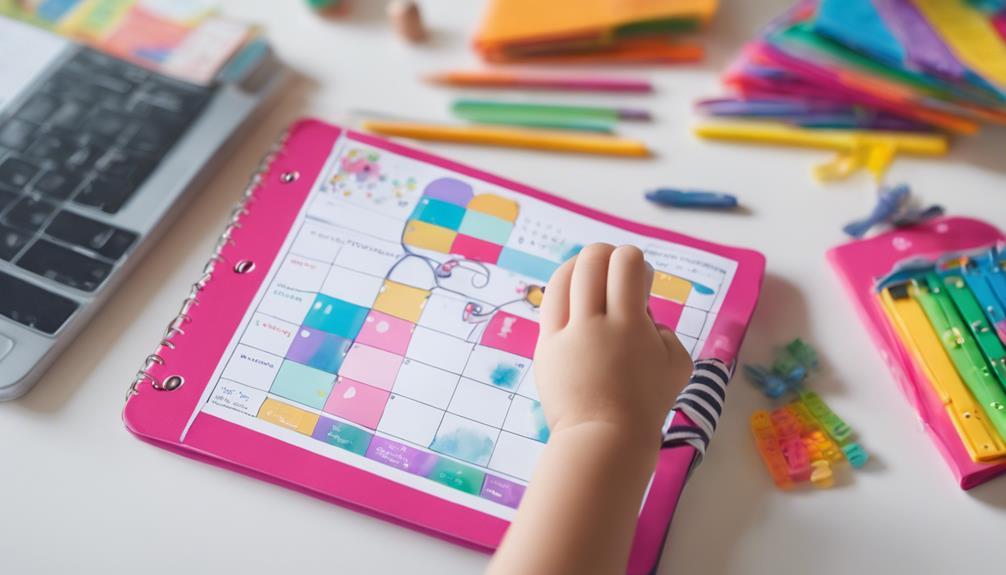
Kids can enhance their productivity and reduce stress by mastering effective time management skills. To improve time management, you should prioritize tasks, create a schedule, and use tools like calendars. Here's how you can develop these skills:
- Prioritize tasks:
Teach kids to identify important tasks and complete them first. By focusing on what needs to be done urgently, they can manage their time more efficiently.
- Create a schedule:
Encourage children to allocate specific time slots for different activities. Having a structured timetable helps them stay organized and guarantees they've enough time for each task.
- Use tools like calendars:
Introduce kids to tools such as calendars, timers, and checklists. These resources can assist them in planning their day, setting reminders, and tracking their progress, leading to better time management outcomes.
Writing Letters
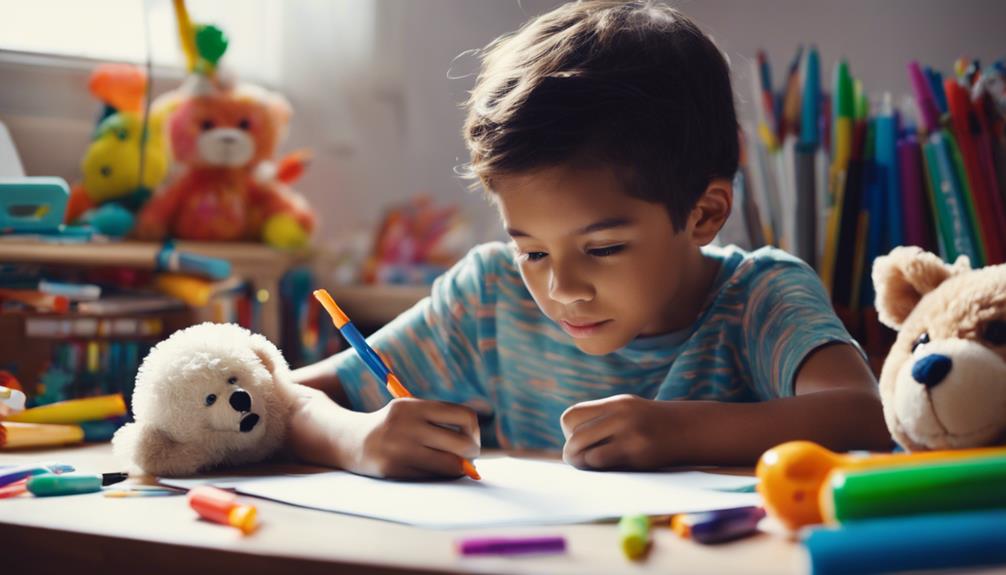
How can children enhance their communication skills in a structured and engaging manner? One effective way is by learning to write letters. Not only does writing letters improve communication skills by providing a format to express thoughts and feelings, but it also offers a practical way to practice spelling, grammar, and punctuation.
Encouraging kids to write letters can foster creativity and imagination as they think about how to effectively convey their message. Additionally, sending letters can help promote empathy and social awareness as children consider the recipient's feelings and perspectives.
Moreover, learning to write letters is beneficial for strengthening fine motor skills and hand-eye coordination. The act of practicing penmanship and forming letters can notably improve these skills in children.
Frequently Asked Questions
What Are the 7 Essential Life Skills?
You need to know the 7 essential life skills. They include decision-making, money management, self-care, communication, resilience, problem-solving, and safety awareness. These skills are vital for handling challenges and building confidence.
What Skills Should an 8 Year Old Have?
You should have basic hygiene habits, effective communication, math, reading, and writing skills. Following instructions, independence in tasks, and taking responsibilities are essential. Problem-solving, empathy, and understanding emotions contribute to social and emotional growth.
How to Teach Kids Basic Life Skills?
To teach kids basic life skills, start by incorporating daily activities like caring for pets and helping with chores. Encourage communication and decision-making through conversations. Foster independence by teaching safety measures and practical skills such as managing money and ordering at restaurants.
What Should a 10 Year Old Know Academically?
You should know that academically, a 10-year-old should have a solid foundation in reading, math, writing, science, and social studies. Understanding texts, basic math operations, writing skills, science concepts, and social studies topics are essential.
Conclusion
To sum up, teaching kids essential life skills is vital for their development and future success. Did you know that children who learn basic first aid skills are more likely to respond confidently and effectively in emergency situations?
By instilling these skills early on, you're empowering your child to be prepared and capable in any situation that may arise. Keep up the great work in teaching them these valuable skills!
Activities and Learning
Chill Out With Fun Winter Activities
Tantalize your winter with a mix of traditional and thrilling activities that will make the season unforgettable.

Winter offers a plethora of enjoyable activities to unwind and have fun. You can lace up and glide across the ice at skating rinks in a festive atmosphere. Indulge in comforting homemade hot chocolate treats that warm both body and soul. Engage with nature by feeding birds in your backyard with a variety of seeds. Immerse yourself in classic games like noughts and crosses to foster creativity and competition. Get out in the snow for adventures like building snow forts, sledding down hills, or creating snow sculptures. These activities are just the beginning of a truly wonderful winter experience.
Key Takeaways
- Ice skating offers exhilarating fun for all ages in a festive atmosphere.
- Enjoy comforting hot chocolate treats, perfect for warming up during winter.
- Delight in bird feeding to connect with nature and bring joy.
- Engage in classic paper and pencil games for nostalgic entertainment.
- Embark on snow day adventures like snowball fights and sledding for outdoor excitement.
Ice Skating Fun
Ice skating, a delightful winter activity enjoyed by individuals of all ages, brings joy and laughter to those gliding across the ice.
Skating rinks, a common sight during the winter season, cater to both beginners and experienced skaters, offering a festive atmosphere filled with excitement.
Laughter, screams, and occasional falls are all part of the ice skating experience, making it a thrilling adventure for children and adults alike.
The sound of blades slicing through the ice and the cool breeze on your face create a sense of freedom and exhilaration.
Whether twirling gracefully or simply trying to stay upright, ice skating provides a wonderful way to embrace the winter season and create lasting memories with loved ones.
Hot Chocolate Treats

During the winter season, indulging in hot chocolate treats can be a comforting and delightful experience. Homemade hot chocolate is a simple yet satisfying treat that warms both body and soul.
By combining chopped chocolate with hot milk, you can create a rich and indulgent beverage perfect for sipping after outdoor activities in cold weather. This beverage can be a great way to involve children in the kitchen, allowing them to assist in the preparation of this cozy drink.
For those looking to elevate their hot chocolate experience, there are various deluxe versions of recipes to explore, from peppermint-infused to caramel-drizzled creations.
Whether enjoyed alone or with loved ones, hot chocolate treats are sure to bring warmth and joy during the chilly winter months.
Bird Feeding Delight

Homemade hot chocolate treats offer a cozy winter indulgence, and another delightful winter activity worth exploring is bird feeding. Feeding the birds during the winter months can bring joy and a sense of connection to nature.
Here are some tips to make bird feeding a delightful experience:
- Choose a variety of bird seeds to attract different bird species.
- Place bird feeders in safe and accessible locations for easy refilling.
- Keep bird feeders clean to prevent the spread of diseases among birds.
- Consider adding suet cakes or nuts for high-energy treats that birds love.
Classic Game Time

Engaging in traditional games offers a nostalgic and interactive pastime during the winter season. Paper and pencil games like noughts and crosses, hangman, and battleships provide a fun alternative to screen time. These classic games are not only entertaining but also encourage creativity and strategic thinking.
Adding a competitive element by offering prizes like sweets can make the experience even more exciting for participants. Playing old school games can create a lively atmosphere filled with laughter, shouting, and giggling.
Choosing paper and pencil games as a winter activity allows children and adults alike to enjoy guilt-free entertainment without the need for electronic devices, fostering a sense of togetherness and camaraderie.
Snow Day Adventures

Snow days present a perfect opportunity to embrace outdoor winter activities and create lasting memories with loved ones. Here are four exciting snow day adventures to enjoy:
- Building snow forts and having epic snowball fights
- Sledding down hills and feeling the rush of the cold wind
- Creating intricate snow sculptures like snowmen or animals
- Going on a winter hike to explore the snowy landscapes
These activities not only provide fun and excitement but also promote bonding and appreciation for the winter season. Make the most of snow days by engaging in these adventurous and memorable experiences with family and friends.
Frequently Asked Questions
Can I Bring My Own Ice Skates to the Skating Rink?
Yes, you can bring your own ice skates to the skating rink. Many facilities allow visitors to bring their own skates. It is always recommended to check the rink's policies beforehand to confirm that personal skates are permitted for use.
What Type of Chocolate Works Best for Homemade Hot Chocolate?
For homemade hot chocolate, using high-quality chocolate with a cocoa content of around 70% works best. This type of chocolate provides a rich and decadent flavor that enhances the overall taste of the hot chocolate, creating a delightful treat for cold winter days.
Is There a Specific Time of Day to Feed Birds in Winter?
Feeding birds in winter can be done at any time of day. However, mornings are ideal as birds are actively foraging for food. Regular feeding can help support wildlife during the scarcity of winter, providing a rewarding experience for both birds and observers.
Are There Age Restrictions for Playing Old School Games?
There are typically no age restrictions for playing old school games. These games, like noughts and crosses or hangman, are enjoyable for all ages. They provide screen-free entertainment and can be a fun and engaging activity for children and adults alike.
What Should I Wear for Snowball Fights and Sledding?
Dress for snowball fights and sledding as if preparing for a battle with winter's icy foes. Opt for waterproof, insulated layers, sturdy boots, gloves, and a hat. Embrace the chill like a snow warrior, ready for snowy adventures.
Conclusion
To wrap up, winter activities offer a delightful way to embrace the season's charm and create lasting memories.
Did you know that ice skating burns approximately 250-400 calories per hour, making it a fun and calorie-burning activity?
Enjoy the winter wonderland while staying active and indulging in cozy treats.
Activities and Learning
Enter Now to Win Amazing Book Bundle
Wander into a world of literary treasures by entering to win an amazing book bundle – the perfect addition to your collection!

Discover how to win an enticing book bundle including titles like 'A Dad Joke A Day' and 'You're Going To Be A Dad!'. Participants aged 18 and above across the globe are eligible. To enter, engage with official social media accounts, like and share the post, tag a friend, and follow specified guidelines for a higher chance of winning. Mark your calendars for the entry deadline, where a winner will be randomly selected and notified through provided contact details. Assure accuracy in information for a smooth prize claim process. Don't miss out on the details and steps to grab this exciting book bundle opportunity!
Key Takeaways
- Follow official social media accounts to enter.
- Like, share the giveaway post, and tag a friend.
- Entry deadline specified for participation.
- Winner selected randomly using reputable tool.
- Winner notified and announced on designated platform.
Prize Details and Eligibility
Discussing the prize details and eligibility for the amazing book bundle giveaway is essential for participants seeking to understand the reward and qualifications required to enter the contest.
The book bundle includes titles such as 'A Dad Joke A Day', 'You're Going To Be A Dad!', 'A Positive Birth', 'A Knock Knock Joke A Day', and 'The Tricky Riddles Book For Smart Kids'.
Participants must be 18 years or older to enter the giveaway. The contest is open internationally, allowing individuals from various regions to participate.
To be eligible, participants must follow the specific entry guidelines outlined in the giveaway announcement. Understanding the prize details and eligibility criteria is crucial for those interested in entering and potentially winning the exciting book bundle.
How to Enter the Giveaway

To participate in the giveaway for the amazing book bundle, interested individuals must adhere to the specified entry instructions provided in the contest announcement.
Here are three key steps to enter the giveaway successfully:
- Follow the official social media accounts associated with the giveaway.
- Like and share the giveaway post to increase your chances of winning.
- Tag a friend in the comments section of the giveaway post to spread the word.
Important Dates and Winner Selection

The selection of the giveaway winner and announcement of important dates will be carried out in line with the terms outlined in the contest rules. The deadline for entries is scheduled for [insert specific date and time].
Following the closure of the entry period, the winner will be randomly chosen using a reputable selection tool or method. Once the winner has been selected, they will be informed via the contact information provided during the entry process. It is vital for participants to verify that their contact details are accurate to prevent any issues with claiming their prize.
The announcement of the winner will be made on [insert platform where the announcement will be posted], providing transparency and making sure all participants are aware of the outcome.
Frequently Asked Questions
Can I Enter the Giveaway Multiple Times?
No, typically giveaways only allow one entry per person to guarantee fairness and equal opportunity for all participants. It is important to follow the rules and guidelines of the giveaway to maintain integrity.
Are the Books in the Bundle Suitable for All Ages?
The books in the bundle cater to different age groups, ranging from dad jokes for kids to guides for new dads and brain teasers for smart kids. The diverse content makes the bundle suitable for a wide audience.
Will the Books Be Available in Digital Format?
In the digital age, accessibility is key. While preserving the charm of physical books is crucial, offering digital formats can enhance reach and convenience. It is recommended to inquire about the availability of the book bundle in digital format.
How Will the Winner Be Notified?
The winner will be notified via email within 48 hours of the giveaway closing. Please make sure the email address provided during entry is accurate and regularly checked to avoid any delays in receiving notification.
Can I Transfer the Prize to Someone Else if I Win?
In adherence to the query about potential prize transferal, kindly be informed that prize transferability is subject to the specific terms and conditions governing the contest. It is advisable to review said conditions for accurate guidance.
Conclusion
Finally, seize the chance to win an exceptional book bundle and unlock the doors to a realm of literary marvels.
Broaden your perspectives, spark your creativity, and revel in a varied assortment of engaging stories and enlightening wisdom.
Enter now for an opportunity to enrich your intellect, nurture your spirit, and set off on a memorable voyage through the magic of books.
Do not overlook this opportunity to win and enhance your reading adventure to fresh levels.
Activities and Learning
Dads' Vital Role in Kids' Sports Success
Pondering how dads impact their kids' sports success? Discover the essential role fathers play in shaping young athletes' mental, physical, and social development.

Fathers play an essential role in children's sports success by positively impacting their mental, physical, and social development. Active involvement, encouragement, and positive support from dads can greatly enhance a child's sports experiences. Balancing competitiveness with constructive feedback is key in fostering a healthy sporting environment. Understanding that most young athletes won't turn professional and promoting skills beyond sports are vital aspects. Dads who instill a love for physical activity and teach life lessons through sports create a strong bond with their children. Their influence goes beyond the field, shaping well-rounded individuals.
Key Takeaways
- Fathers influence children's sports involvement significantly.
- Positive parenting and support enhance kids' sports experiences.
- Balancing competitiveness with encouragement is crucial.
- Realistic approach: not all young athletes turn professional.
- Teaching skills beyond sports strengthens parent-child bond.
The Importance of Dads in Sports
The pivotal role that fathers play in their children's sports involvement and development cannot be emphasized enough. Fathers who actively participate in their children's sports activities contribute significantly to their overall well-being.
Research shows that children engaged in team sports experience better mental health, physical fitness, and social skills development. Through sports, kids learn essential values like collaboration, cooperation, and teamwork, setting a strong foundation for their future.
Additionally, involvement in physical activities during childhood often translates into an active lifestyle in adulthood. Fathers who support and encourage their children in sports not only foster their athletic abilities but also instill valuable life lessons that extend far beyond the playing field.
Positive Parenting in Sports

Active involvement and positive support from parents play an important role in shaping children's experiences and success in sports. Studies indicate that kids enjoy sports more when their parents provide constructive and encouraging feedback.
Pushy behavior or criticism from parents can have a negative impact on a child's enjoyment of sports and may even deter them from participating. It is vital for parents, especially dads, to balance competitiveness with positive reinforcement to maintain a healthy and supportive environment for children in sports.
Realistic Approach to Sports
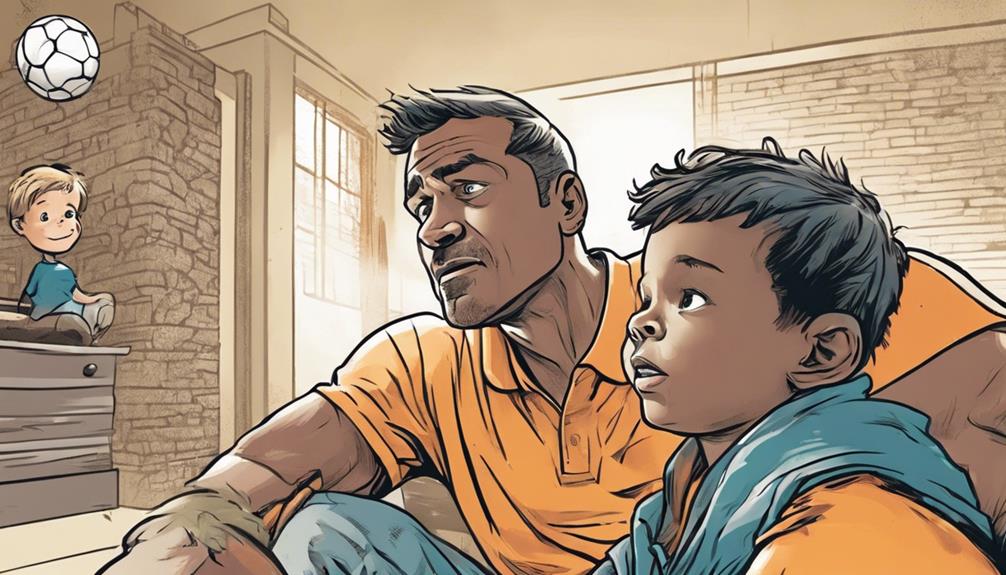
Parents, particularly fathers, should adopt a pragmatic perspective when guiding their children's involvement in sports. It is essential to maintain a realistic approach to sports, understanding that the vast majority of young athletes will not become professional players. Instead of solely focusing on dreams of fame and riches, dads can broaden their children's horizons by teaching skills beyond sports, such as cooking and coding. Encouraging an appreciation for physical activity and nature can instill lifelong healthy habits. A balanced approach to teaching sports not only benefits the child's development but also strengthens the parent-child bond.
| Benefits of a Realistic Approach to Sports | Impact |
|---|---|
| Fosters lifelong healthy habits | Positively influences long-term well-being |
| Strengthens parent-child bond | Builds a supportive and understanding relationship |
| Broadens children's skills beyond sports | Enhances overall personal development |
Frequently Asked Questions
Can Dads' Involvement in Kids' Sports Affect Their Academic Performance?
Dads' involvement in kids' sports can positively impact academic performance by promoting discipline, time management, and goal-setting skills. Active participation in sports fosters a well-rounded development that can translate into improved academic success and overall well-being.
How Can Dads Balance Their Own Sports Interests With Their Kids' Choices?
Dads can balance their sports interests with kids' choices by prioritizing children's preferences, fostering a supportive environment, and emphasizing enjoyment over competition. Engaging in shared physical activities can deepen the bond while promoting a healthy lifestyle.
What Are Some Creative Ways Dads Can Support Kids in Individual Sports?
Supporting kids in individual sports involves fostering independence while providing guidance. Dads can offer encouragement, attend competitions, help set goals, and celebrate achievements. Encouraging perseverance, resilience, and a positive attitude can help kids thrive in their chosen sport.
Are There Specific Sports That Dads Should Encourage Over Others?
Encouraging children to participate in sports offers numerous benefits such as improved mental health, physical fitness, social skills, and lifelong physical activity habits. Dads should prioritize sports that align with their child's interests and abilities for best development.
How Can Dads Handle Conflicts With Other Parents During Kids' Sports Events?
Dads facing conflicts with other parents during kids' sports events should prioritize calm, respectful communication. Focusing on the child's well-being and emphasizing sportsmanship over winning can help resolve disagreements and maintain a positive environment for all involved.
Conclusion
To sum up, fathers play a vital role in shaping young athletes' success and overall well-being in children's sports. Research shows that children with involved fathers are more likely to excel in sports and develop positive physical, mental, and social skills.
One interesting statistic reveals that children with supportive fathers are 80% more likely to continue participating in sports throughout their teenage years. This highlights the significant impact fathers have on their children's sporting journeys and emphasizes the importance of their positive involvement.
-

 Activities and Learning4 months ago
Activities and Learning4 months agoEngage Quiet Students With Interactive Quiz Apps
-

 Vetted4 months ago
Vetted4 months ago9 Best Personalized Father's Day Gifts for Your Husband – Thoughtful and Unique Ideas
-

 Activities and Learning4 months ago
Activities and Learning4 months agoAvelox: A Prescription-Free Risk
-

 Activities and Learning4 months ago
Activities and Learning4 months agoActive Forum Requires User Interaction for Access
-

 General Tips4 months ago
General Tips4 months agoStruggling Mom Quotes: Words of Hope and Encouragement!
-

 Activities and Learning4 months ago
Activities and Learning4 months agoRobaxin: CVS Orders, Renal Health Caution
-

 Activities and Learning4 months ago
Activities and Learning4 months agoGet Levaquin: Treat Infections & Stay Safe
-

 Activities and Learning4 months ago
Activities and Learning4 months agoCabaser: Risks, Alternatives, and Gambling Concerns




































